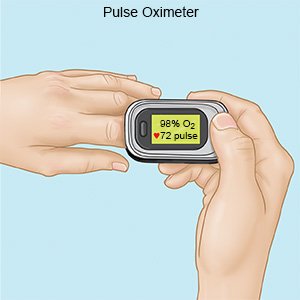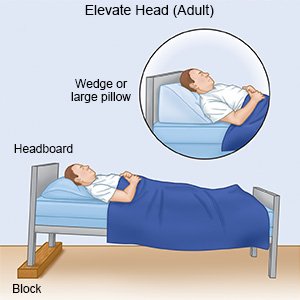Pneumonia
Medically reviewed by Drugs.com. Last updated on Apr 2, 2024.
What is pneumonia?
Pneumonia is an infection in your lungs caused by bacteria, viruses, fungi, or parasites. You can become infected if you come in contact with someone who is sick. You can get pneumonia if you recently had surgery or needed a ventilator to help you breathe. Pneumonia can also be caused by accidentally inhaling saliva or small pieces of food. Pneumonia may cause mild symptoms, or it can be severe and life-threatening.
 |
What increases my risk for pneumonia?
- A cold or the flu
- Health conditions, such as heart or lung disease
- A weakened immune system caused by HIV, cancer, or steroid use
- Recent hospitalization
- Smoking
- Excess alcohol use
- Older age
What are the signs and symptoms of pneumonia?
- Fever or chills
- Cough
- Shortness of breath or rapid breathing
- Chest pain when you cough or breathe deeply
- Headache
- Vomiting
- Fatigue or confusion
How is pneumonia diagnosed?
Your healthcare provider will listen to your lungs. Tell him or her if you have other health conditions. Give your provider a complete list of all medicines you have taken recently. You may need any of the following:
- Blood tests may show signs of an infection or the bacteria causing your pneumonia. Blood tests can also show how much oxygen is in your blood.
- A chest x-ray may show signs of infection in your lungs.
- Pulse oximetry measures the amount of oxygen in your blood.

- A mucus sample is collected and tested for the germ that is causing your pneumonia. It can help your healthcare provider choose the best medicine to treat the infection.
How is pneumonia treated?
- Antibiotics treat pneumonia caused by bacteria.
- Acetaminophen decreases pain and fever. It is available without a doctor's order. Ask how much to take and how often to take it. Follow directions. Read the labels of all other medicines you are using to see if they also contain acetaminophen, or ask your doctor or pharmacist. Acetaminophen can cause liver damage if not taken correctly.
- NSAIDs , such as ibuprofen, help decrease swelling, pain, and fever. This medicine is available with or without a doctor's order. NSAIDs can cause stomach bleeding or kidney problems in certain people. If you take blood thinner medicine, always ask your healthcare provider if NSAIDs are safe for you. Always read the medicine label and follow directions.
- Airway clearance techniques are exercises to help remove mucus so you can breathe more easily. Your healthcare provider will show you how to do the exercises. These exercises may be used along with machines or devices to help decrease your symptoms.
- Respiratory support is given to help you breathe. You may receive oxygen to increase the level of oxygen in your blood. You may also need a machine to help you breathe.
Treatment options
The following list of medications are related to or used in the treatment of this condition.
What can I do to manage my symptoms?
- Rest as needed. Rest often throughout the day. Alternate times of activity with times of rest.
- Drink liquids as directed. Ask how much liquid to drink each day and which liquids are best for you. Liquids help thin your mucus, which may make it easier for you to cough it up.
- Do not smoke. Smoking increases your risk for pneumonia. Smoking also makes it harder for you to get better after you have had pneumonia. Ask your healthcare provider for information if you need help to quit smoking. Avoid secondhand smoke.
- Limit alcohol. Women should limit alcohol to 1 drink a day. Men should limit alcohol to 2 drinks a day. A drink of alcohol is 12 ounces of beer, 5 ounces of wine, or 1½ ounces of liquor.
- Use a cool mist humidifier. A humidifier will help increase air moisture in your home. This may make it easier for you to breathe and help decrease your cough.
- Keep your head elevated. You may be able to breathe better if you keep your head and upper body elevated.

What can I do to prevent pneumonia?
- Wash your hands often. Use soap and water. Wash for at least 20 seconds. Rinse with warm, running water for several seconds. Then dry your hands with a clean towel or paper towel. Use hand sanitizer that contains alcohol if soap and water are not available. Do not touch your eyes, nose, or mouth without washing your hands first.

- Cover a sneeze or cough. Use a tissue that covers your mouth and nose. Throw the tissue away in a trash can right away. Use the bend of your arm if a tissue is not available. Wash your hands well with soap and water or use a hand sanitizer. Do not stand close to anyone who is sneezing or coughing.
- Stay away from others until you are well. Do not go to work or other activities. Wait until your symptoms are gone or your healthcare provider says it is okay to return.
- Ask about vaccines you may need. A pneumonia vaccine can help lower your risk for pneumonia. The vaccine may be recommended every 5 years, starting at age 65. Other vaccines help lower the risk for infections that can become serious for a person who has pneumonia. Get a flu vaccine each year as soon as recommended, usually in September or October. Get a COVID-19 vaccine and booster as directed. Your healthcare provider can tell you if you should also get other vaccines, and when to get them.
 |
When should I seek immediate care?
- You cough up blood.
- Your heart beats more than 100 beats in 1 minute.
- You are very tired, confused, and cannot think clearly.
- You have chest pain or trouble breathing.
- Your lips or fingernails turn gray or blue.
When should I call my doctor?
- Your symptoms are the same or get worse 48 hours after you start antibiotics.
- Your fever is not below 99°F (37.2°C) 48 hours after you start antibiotics.
- You have a fever higher than 101°F (38.3°C).
- You cannot eat, or you have loss of appetite, nausea, or are vomiting.
- You have questions or concerns about your condition or care.
Care Agreement
You have the right to help plan your care. Learn about your health condition and how it may be treated. Discuss treatment options with your healthcare providers to decide what care you want to receive. You always have the right to refuse treatment. The above information is an educational aid only. It is not intended as medical advice for individual conditions or treatments. Talk to your doctor, nurse or pharmacist before following any medical regimen to see if it is safe and effective for you.© Copyright Merative 2024 Information is for End User's use only and may not be sold, redistributed or otherwise used for commercial purposes.
Learn more about Pneumonia
Treatment options
Care guides
- Aspiration Pneumonia
- Bacterial Pneumonia
- Community Acquired Pneumonia
- Hospital Acquired Pneumonia
- Pneumonia in Children
- Pontiac Fever
- Viral Pneumonia
Symptoms and treatments
Further information
Always consult your healthcare provider to ensure the information displayed on this page applies to your personal circumstances.
